Hiring a Chief Technology Officer (CTO) is a strategic decision for any organization aiming to leverage technology for growth and innovation. A CTO not only drives technological initiatives but also aligns them with business objectives. However, organizations often struggle with defining the precise role of a CTO, identifying the right skills, and integrating them into the existing leadership team.
This article is your comprehensive guide to hiring a CTO. We'll cover the necessary skills and qualifications, crafting an effective job description, sourcing strategies, and interview structuring. Along the way, explore our recommended interview questions for CTOs.
Table of contents
Why Hire a Chief Technology Officer?
A Chief Technology Officer (CTO) can be a game-changer for your organization's technological strategy and innovation. Before hiring, identify specific tech challenges your company faces. For instance, you might need someone to lead a digital transformation initiative or develop a robust cybersecurity framework.
Consider these potential areas where a CTO could make an impact:
- Aligning technology strategies with business goals
- Overseeing the development of new products or services
- Managing and optimizing IT infrastructure and resources
If these challenges are ongoing and critical to your business growth, it may be time to hire a full-time CTO. However, if you're unsure about the long-term need, consider starting with a consultant to assess your technology needs and potential ROI of a full-time CTO.
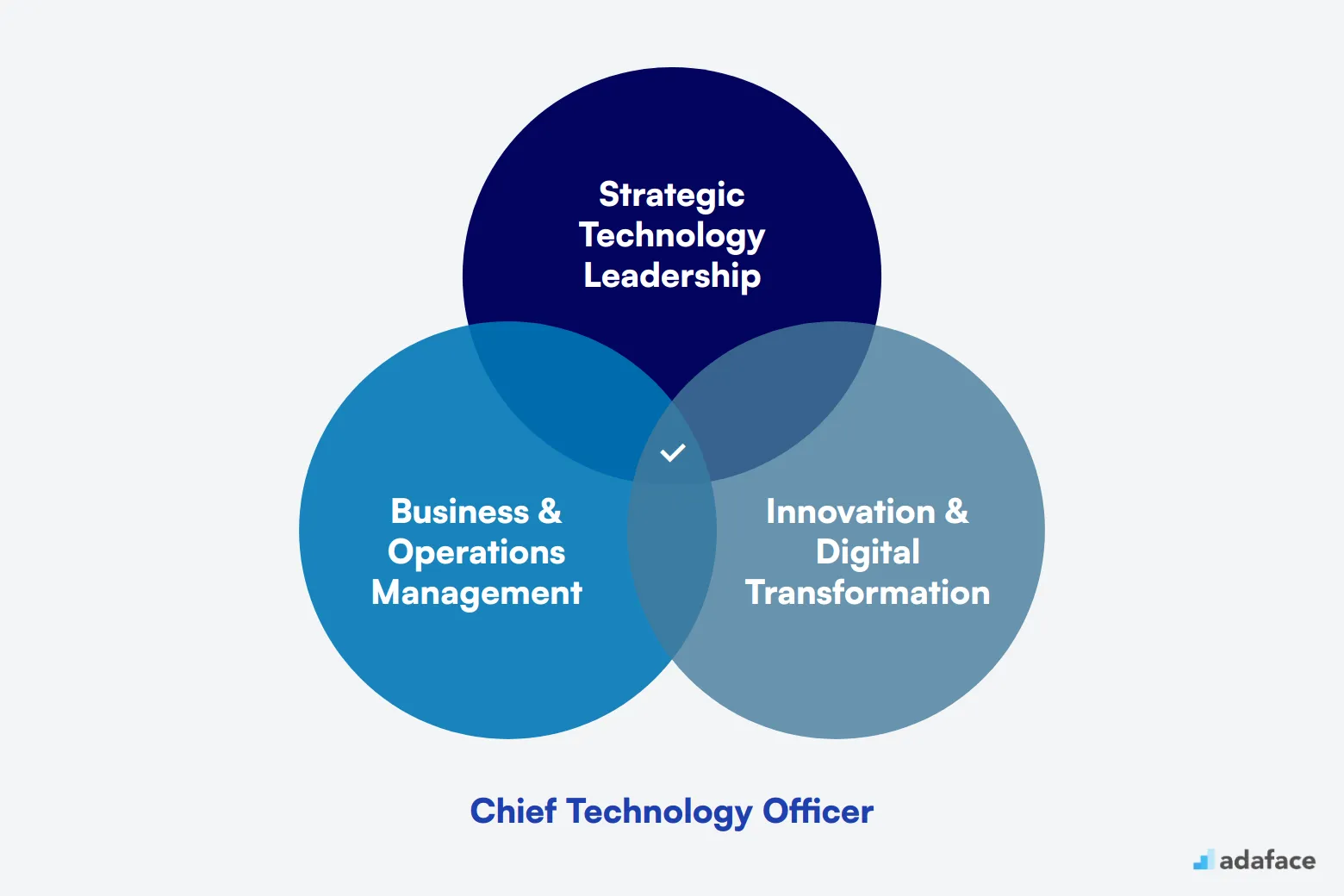
Key Skills and Qualifications for a Chief Technology Officer
Hiring a Chief Technology Officer (CTO) is a complex process, as the ideal candidate may vary significantly from one organization to another. Recruiters often struggle to differentiate between must-have and nice-to-have skills, leading to misaligned expectations during the hiring process.
To create a clear candidate profile, it’s important to outline both the required and preferred qualifications. This will help streamline your search and ensure that you attract candidates who not only meet your immediate needs but also align with your long-term vision.
| Required skills and qualifications | Preferred skills and qualifications |
|---|---|
| 10+ years of experience in technology leadership roles | MBA or advanced degree in Computer Science or related field |
| Strong background in software development and architecture | Experience in cloud computing and infrastructure management |
| Proven track record of successful product launches and technology implementations | Knowledge of AI and machine learning technologies |
| Experience in strategic planning and execution of technology initiatives | Background in cybersecurity and data privacy |
| Excellent communication and leadership skills | Experience with agile methodologies and DevOps practices |
How to write a Chief Technology Officer job description?
Once you have a candidate profile ready, the next step is to capture that information in the job description to attract the right candidates. A well-crafted job description is key to drawing in top talent for this strategic role.
- Highlight key responsibilities and impact: Clearly outline the specific duties of the CTO, such as leading technology strategy and overseeing development teams. Make sure to emphasize how these responsibilities contribute to the overall success of the organization.
- Balance technical requirements with leadership skills: It's important to list required technical competencies, such as experience with cloud computing and software development, alongside leadership qualities like communication and team-building. A successful CTO must not only be tech-savvy but also able to inspire and guide their team.
- Showcase your company and the role's unique selling points: Highlight what makes your organization an attractive place to work, whether it's innovative projects, a collaborative culture, or opportunities for professional growth. This will help differentiate your CTO position from others and attract candidates who align with your values.
Top Platforms to Source Chief Technology Officers
Now that you have a solid job description, it's time to list your CTO position on job sites to attract qualified candidates. The right platform can significantly impact the quality and quantity of applicants you receive. Let's explore some of the best options for finding your next tech leader.
Ideal for listing full-time CTO positions due to its wide professional network and advanced job listing features.

AngelList
Best for startups looking to hire CTOs with experience in early-stage companies and innovative technology.
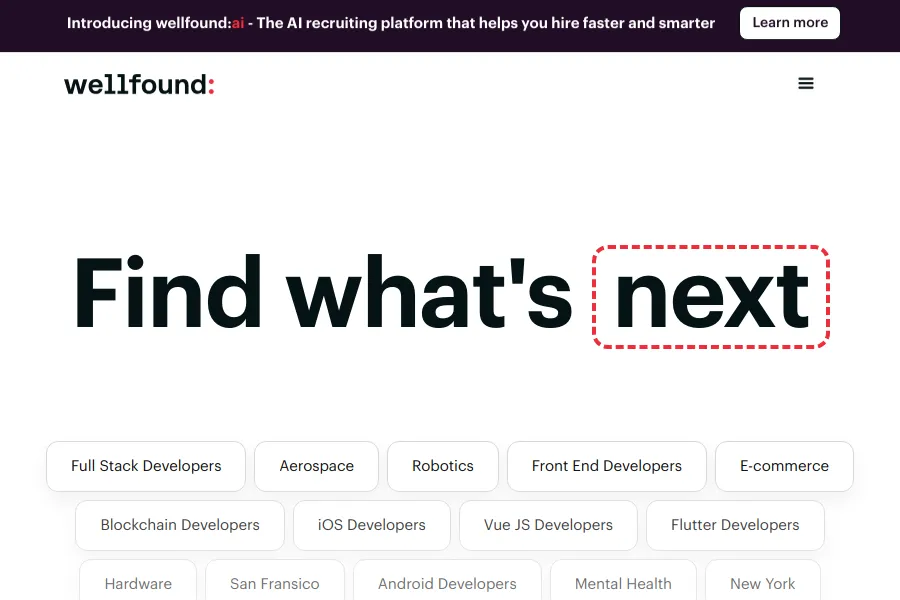
Toptal
Great for finding freelance or part-time CTOs with a focus on high-quality tech talent.
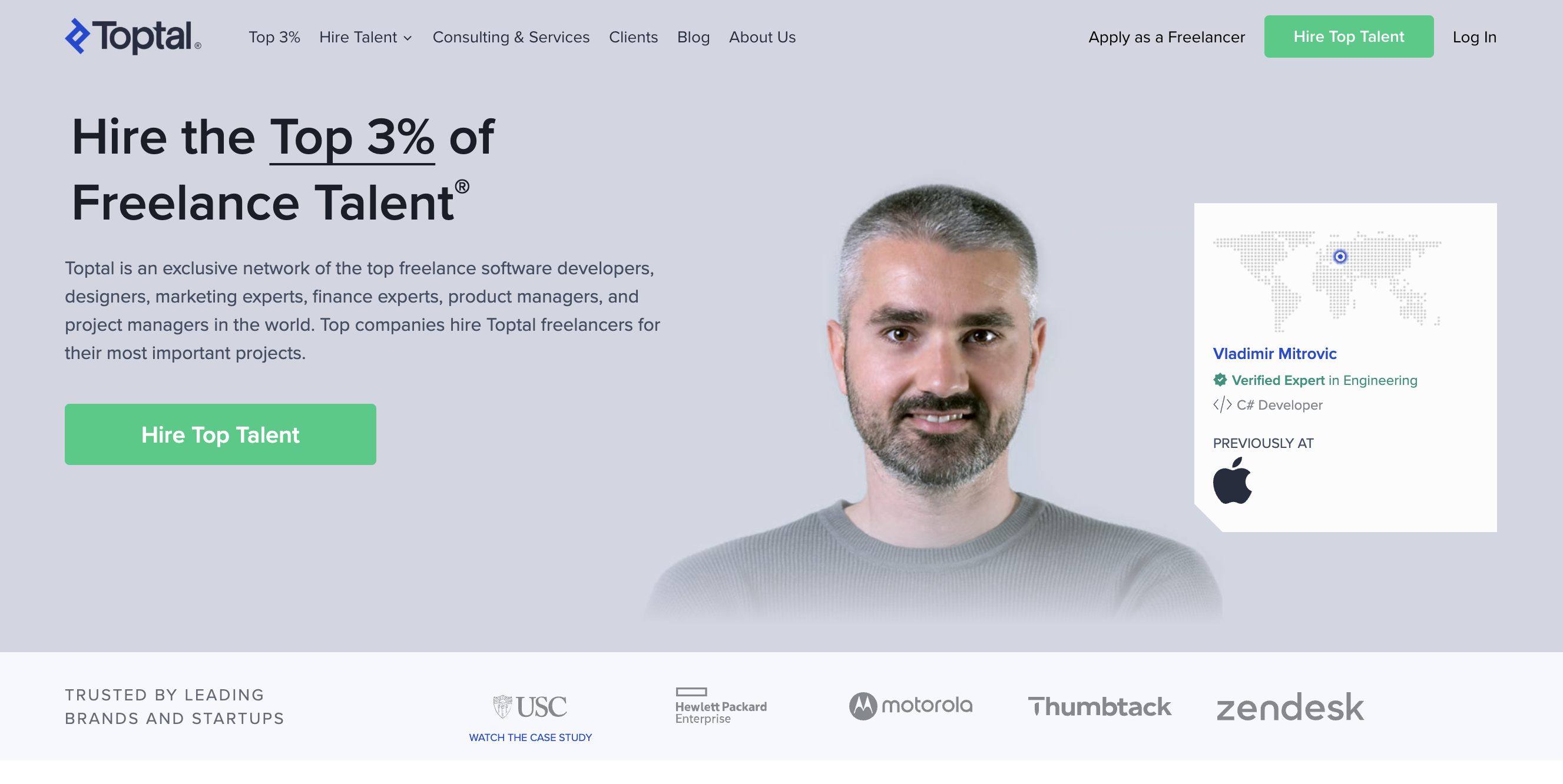
Other noteworthy platforms include Dice for tech-specific roles, Monster for broader reach, FlexJobs for remote positions, Built In for tech startups, Glassdoor for company insights, and GitHub Jobs for highly technical CTOs. Each platform offers unique benefits, so consider your specific needs when choosing where to post your CTO job listing. Remember to tailor your job posting to each platform for maximum effectiveness.
Keywords to Look for in Chief Technology Officer Resumes
Resume screening is a key step in finding the right CTO. It helps you quickly identify candidates with the most relevant experience and skills before moving to interviews.
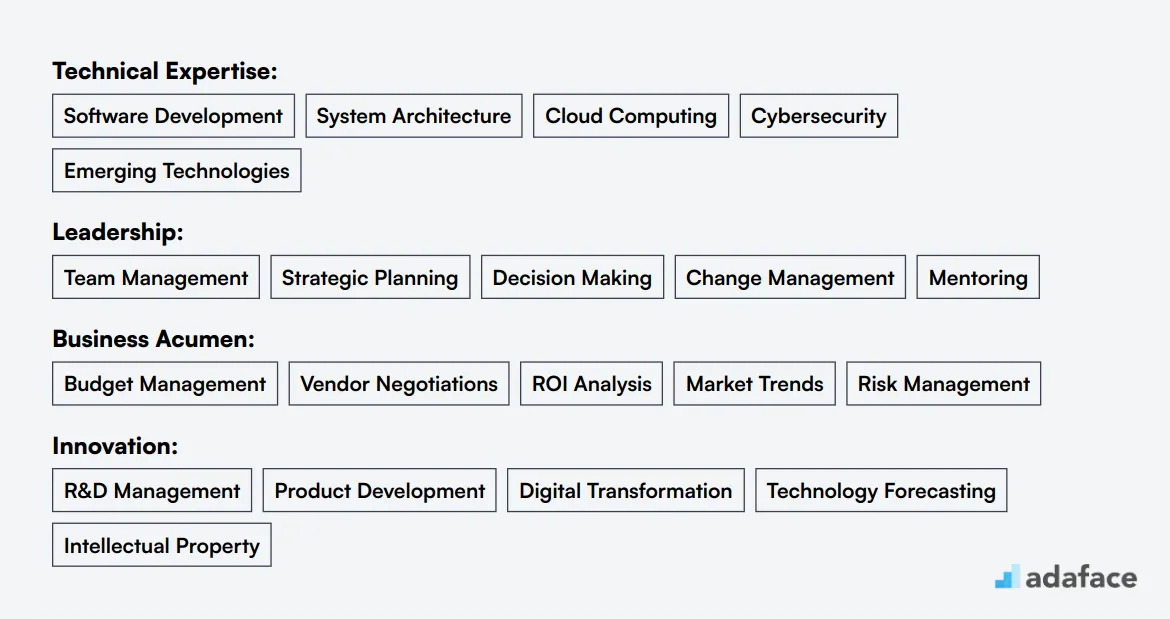
When manually screening resumes, focus on keywords that align with the CTO role. Look for terms like 'strategic technology leadership', 'digital transformation', and 'innovation management'. Also, keep an eye out for specific technical skills required for a CTO.
AI-powered tools can streamline the resume screening process. You can use large language models like GPT or Claude to analyze resumes based on predefined criteria. This approach can save time and provide consistent evaluations across all candidates.
Here's a sample prompt for AI-assisted CTO resume screening:
TASK: Screen resumes for Chief Technology Officer role
INPUT: Resumes
OUTPUT: For each resume, provide:
- Name
- Matching keywords
- Score (out of 10)
- Recommendation
- Shortlist (Yes/No/Maybe)
KEYWORDS:
- Strategic technology leadership
- Business & operations management
- Innovation & digital transformation
- Software development & architecture
- Cloud computing & infrastructure
- Cybersecurity & data privacy
- AI & machine learning
- Team leadership & mentoring
- Budget management & ROI analysis
Customize this prompt based on your specific CTO job requirements for best results.
Recommended Skills Tests to Screen Chief Technology Officers
When hiring a Chief Technology Officer (CTO), leveraging skills tests ensures you're identifying candidates who not only talk the talk but can also walk the walk. Skills tests provide a reliable method to evaluate a candidate's actual abilities beyond just what their resume states.
Software Engineering Tests: Software engineering proficiency is a must for a CTO. These tests assess a candidate's capability in various software development methodologies and tools, ensuring they have the experience required to lead a technical team. Explore software engineering tests.
DevOps Tests: A CTO needs a strong grasp of modern DevOps practices. These tests evaluate understanding in areas like CI/CD pipelines and automation scripts, ensuring that candidates can foster a smooth development-to-operations workflow. Find out more about DevOps tests.
Cloud Computing Tests: With most enterprises moving to cloud infrastructure, a CTO should be knowledgeable in cloud computing. These tests measure skills in platforms like AWS and Azure, ensuring a candidate can manage and optimize cloud usage. Learn about cloud computing tests.
Cyber Security Tests: Cyber security is paramount for any tech leadership role. These tests assess a candidate's ability to protect an organization's data and systems from threats, which is critical for safeguarding company information. Explore cyber security tests.
Project Management Tests: While technical skills are crucial, a CTO also needs project management expertise to lead projects to successful completion. These tests evaluate ability in planning, executing, and closing projects efficiently. Learn about project management tests.
Case Study Assignments for Hiring Chief Technology Officers
Case study assignments can be valuable tools for assessing CTO candidates. However, they come with drawbacks such as lengthy completion times, lower participation rates, and the risk of losing top talent due to the time commitment. Despite these challenges, well-designed case studies can provide insights into a candidate's problem-solving skills and strategic thinking.
Technology Strategy Overhaul: This case study asks candidates to develop a comprehensive technology strategy for a fictional company facing digital transformation challenges. It evaluates the CTO's ability to align technology initiatives with business goals and manage complex IT projects.
Cybersecurity Crisis Management: Candidates are presented with a scenario involving a major security breach. This assignment tests their ability to handle crisis situations, implement robust security measures, and communicate effectively with stakeholders during high-pressure situations.
Innovation and R&D Planning: This case study focuses on creating an innovation roadmap for a company looking to stay competitive in a rapidly evolving tech landscape. It assesses the CTO's vision, ability to identify emerging technologies, and skills in fostering a culture of innovation within an organization.
How to structure the interview stage for hiring Chief Technology Officers
After filtering out unfit candidates with initial skills assessments, it's time to move suitable candidates to the technical interview stage. This stage is crucial as it provides an opportunity to evaluate a candidate's hard skills and in-depth technical knowledge, elements that online skills tests alone might not fully capture. Here, the focus is on understanding their problem-solving abilities and strategic thinking.
Consider asking the following questions during CTO interviews: 1. What are the most significant technology trends you foresee impacting our industry? This assesses their market awareness. 2. How have you previously addressed security issues in a tech project? Evaluates their experience with security. 3. Can you describe a time you led a major tech transformation? Tests leadership and change management skills. 4. How do you prioritize technical debt and innovation? Balances long-term vision and immediate needs. 5. Can you give an example of a time you aligned tech strategy with business goals? This is important for strategic alignment. Additionally, refer to comprehensive CTO interview questions to structure effective interviews.
Understanding the Cost of Hiring a Chief Technology Officer
Hiring a Chief Technology Officer (CTO) involves a significant investment, with U.S. salaries averaging around $175,340. Depending on factors such as geography, company size, and the individual’s experience, salaries can range from approximately $94,646 to $273,623. In tech-centric cities, compensation can exceed $300,000, so it's important to plan according to your specific market.
Chief Technology Officer Salary in the United States
The average salary for a Chief Technology Officer (CTO) in the United States is approximately $175,340. Salaries can range from a low of about $94,646 to a high of $273,623, depending on factors like location and the size of the company. For instance, in tech hubs like San Francisco and San Diego, CTO salaries can exceed $300,000, while cities like Baltimore and Charlotte report lower figures around $168,093.
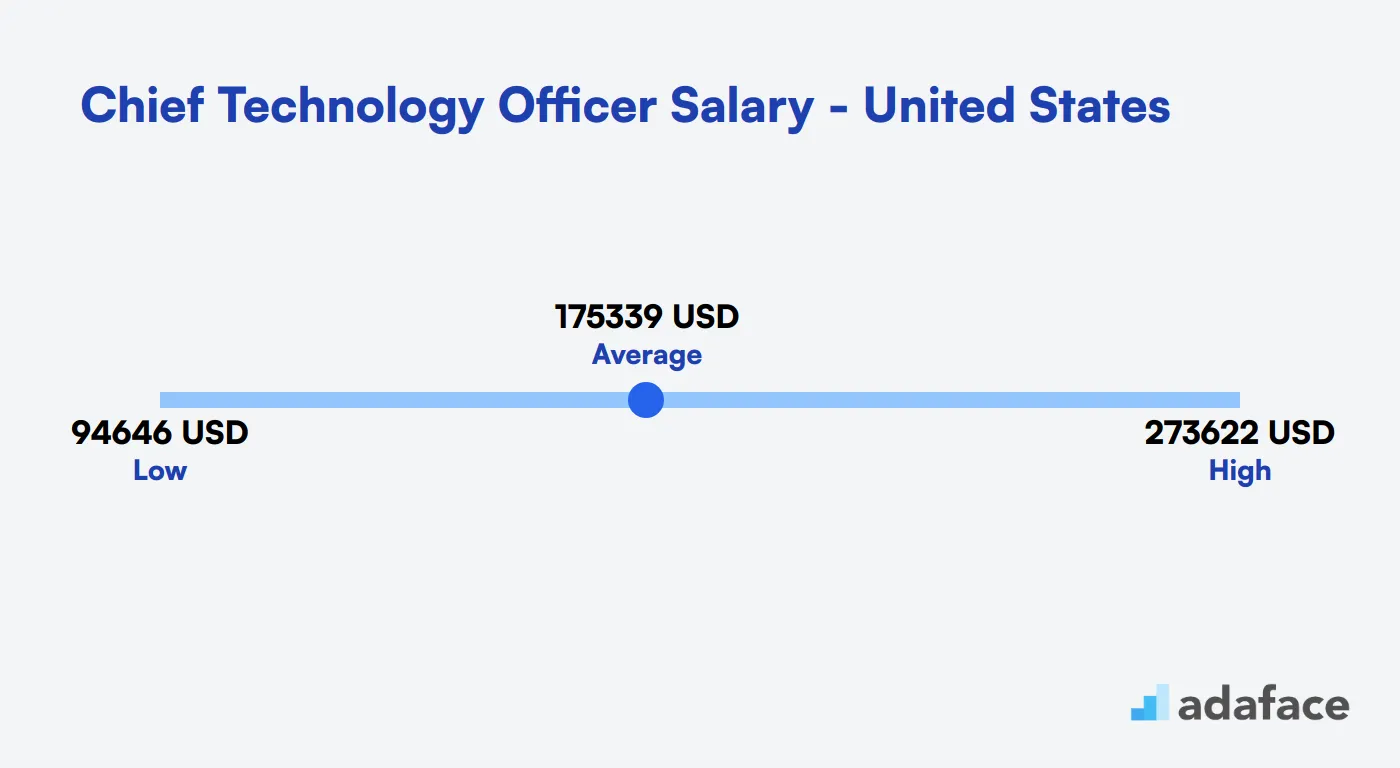
Chief Technology Officer Salary in Canada
In Canada, the average salary for a Chief Technology Officer (CTO) can vary significantly depending on the city. Nationally, CTOs earn an average of CAD 154,666, with salaries ranging from CAD 72,701 to CAD 257,816. For instance, in Montréal, CTOs earn between CAD 117,126 and CAD 473,263, with an average of CAD 273,106. Meanwhile, in Toronto, salaries range from CAD 74,252 to CAD 266,610, with a mean salary of CAD 159,333. These variations highlight the impact of location on CTO salaries across Canada.
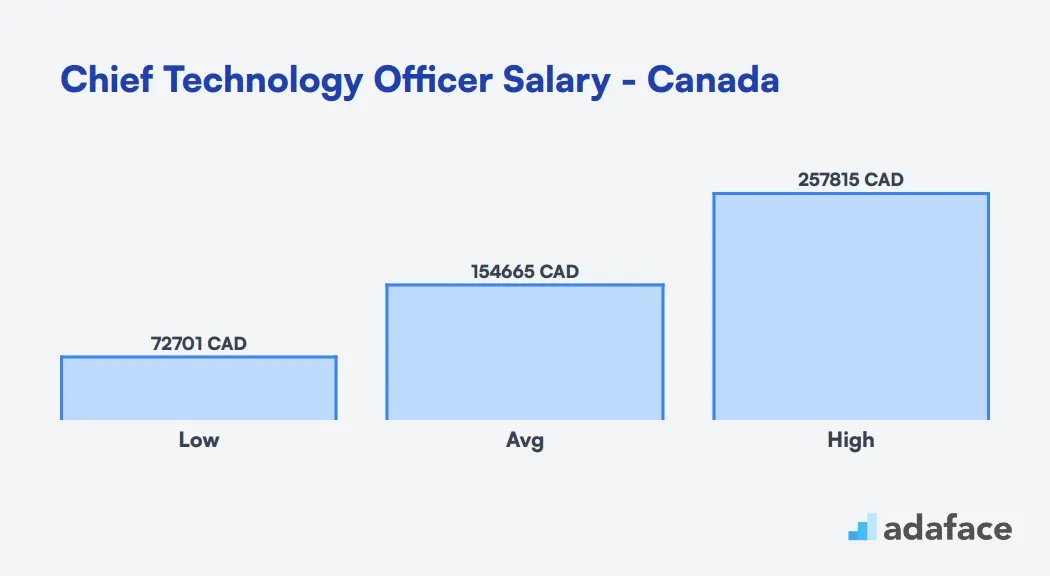
What are the ranks of Chief Technology Officers?
Many people confuse the Chief Technology Officer (CTO) role with other executive positions in tech. However, the CTO role itself can have different ranks and responsibilities depending on the organization's size and structure.
- Startup CTO: In small companies or startups, the CTO often wears many hats. They're hands-on with coding, product development, and technical decision-making. They might be the sole tech leader, working closely with the CEO.
- Mid-level CTO: As companies grow, the CTO role evolves. They focus more on strategy and less on day-to-day coding. They manage a team of developers and work on scaling the tech infrastructure.
- Enterprise CTO: In large corporations, the CTO is a high-level executive. They oversee technology strategy, innovation, and large-scale tech operations. They work closely with other C-suite executives and may have several directors reporting to them.
- Group CTO: Some multinational companies have multiple CTOs for different divisions or regions. The Group CTO oversees all of them, setting the overall tech direction for the entire organization.
- Chief Innovation Officer: In some companies, the top tech role is split. The CTO handles current tech operations, while the Chief Innovation Officer focuses on future tech trends and R&D.
When hiring a CTO, it's crucial to define which level of CTO your company needs. This will help you craft an appropriate job description and set clear expectations for the role.
Hire the Best Chief Technology Officers for Your Organization
Throughout this post, we've explored the various facets of hiring a Chief Technology Officer (CTO), from understanding why a CTO is vital to identifying the key skills and competencies required for the role. We've also looked at crafting effective job descriptions and optimizing the interview process to ensure you're selecting the best candidate.
The key takeaway is the importance of precision in the hiring process. Accurate job descriptions, alongside targeted skills assessments, are essential tools in finding the right CTO. For instance, using specialized software engineering tests can help ensure candidates possess the technical prowess required for the position. By focusing on these elements, you can greatly enhance your chances of hiring a CTO who can drive your organization forward.
Software Engineering Online Test
FAQs
A CTO is responsible for overseeing the technological framework, aligning tech strategies with business goals, and driving innovations.
An effective CTO job description should clearly outline the key responsibilities, required skills, and experience needed for the role.
Platforms like LinkedIn, executive search firms, and specialized tech job boards are ideal for sourcing CTO candidates.
Key skills for a CTO include leadership, strategic thinking, technical expertise, and excellent communication abilities.
Use skills tests and technical assessments tailored to the specific technologies relevant to your organization.
The CTO interview process should include technical interviews, culture fit assessments, and discussions on leadership and strategic vision.
Hiring a CTO is crucial for companies looking to innovate, lead in technology, and integrate technology into their business strategy.

40 min skill tests.
No trick questions.
Accurate shortlisting.
We make it easy for you to find the best candidates in your pipeline with a 40 min skills test.
Try for freeRelated posts
Free resources



